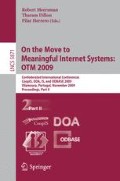Abstract
Human memory is not perfect – people constantly memorize new facts and forget old ones. One example is forgetting a password, a common problem raised at IT help desks. We present several protocols that allow a user to automatically recover a password from a server using partial knowledge of the password. These protocols can be easily adapted to the personal entropy setting [7], where a user can recover a password only if he can answer a large enough subset of personal questions.
We introduce client-server password recovery methods, in which the recovery data are stored at the server, and the recovery procedures are integrated into the login procedures. These methods apply to two of the most common types of password based authentication systems. The security of these solutions is significantly better than the security of presently proposed password recovery schemes. For our protocols we propose a variation of threshold encryption [5, 8, 16] that might be of independent interest.
Access this chapter
Tax calculation will be finalised at checkout
Purchases are for personal use only
Preview
Unable to display preview. Download preview PDF.
References
Bellare, M., Rogaway, P.: Random oracles are practical: a paradigm for designing efficient protocols. In: CCS 1993: Proceedings of the 1st ACM Conference on Computer and Communications Security, pp. 62–73. ACM, New York (1993)
Blakley, G.: Safeguarding cryptographic keys. In: AFIPS Conference Proceedings, June 1979, vol. 48, pp. 313–317 (1979)
Bleichenbacher, D., Nguyen, P.Q.: Noisy polynomial interpolation and noisy chinese remaindering. In: Preneel, B. (ed.) EUROCRYPT 2000. LNCS, vol. 1807, pp. 53–69. Springer, Heidelberg (2000)
Boneh, D.: Finding smooth integers in short intervals using CRT decoding. Journal of Computer and System Sciences 64(4), 768–784 (2002)
Damgard, I., Jurik, M., Nielsen, J.B.: A generalization of Paillier’s public-key system with applications to electronic voting (2003), http://citeseerx.ist.psu.edu/viewdoc/summary?doi=10.1.1.13.3383
Dodis, Y., Ostrovsky, R., Reyzin, L., Smith, A.: Fuzzy extractors: How to generate strong keys from biometrics and other noisy data CoRR abs/cs/0602007 (2006), http://arxiv.org/abs/cs/0602007
Ellison, C., Hall, C., Milbert, R., Schneier, B.: Protecting secret keys with personal entropy. Future Generation Computer Systems 16(4), 311–318 (2000)
Fouque, P.-A., Poupard, G., Stern, J.: Sharing decryption in the context of voting or lotteries. In: Frankel, Y. (ed.) FC 2000. LNCS, vol. 1962, pp. 90–104. Springer, Heidelberg (2001)
Frykholm, N., Juels, A.: Error-tolerant password recovery. In: CCS 2001: Proceedings of the 8th ACM Conference on Computer and Communications Security, pp. 1–9. ACM, New York (2001)
Gamal, T.E.: A public key cryptosystem and a signature scheme based on discrete logarithms. In: Blakely, G.R., Chaum, D. (eds.) CRYPTO 1984. LNCS, vol. 196, pp. 10–18. Springer, Heidelberg (1985)
Goldreich, O.: Foundations of Cryptography: Basic Applications, vol. 2. Cambridge University Press, New York (2004)
Kanukurthi, B., Reyzin, L.: An improved robust fuzzy extractor. In: Ostrovsky, R., De Prisco, R., Visconti, I. (eds.) SCN 2008. LNCS, vol. 5229, pp. 156–171. Springer, Heidelberg (2008)
Lipmaa, H.: An oblivious transfer protocol with log-squared communication. In: Zhou, J., López, J., Deng, R.H., Bao, F. (eds.) ISC 2005. LNCS, vol. 3650, pp. 314–328. Springer, Heidelberg (2005)
Naor, M., Pinkas, B.: Oblivious polynomial evaluation. SIAM J. Comput. 35(5), 1254–1281 (2006)
Nisan, N., Ta-Shma, A.: Extracting randomness: a survey and new constructions. J. Comput. Syst. Sci. 58(1), 148–173 (1999)
Schoenmakers, B., Tuyls, P.: Practical two-party computation based on the conditional gate. In: Lee, P.J. (ed.) ASIACRYPT 2004. LNCS, vol. 3329, pp. 119–136. Springer, Heidelberg (2004)
Shamir, A.: How to share a secret. Communications of the ACM 22(11), 612–613 (1979)
Author information
Authors and Affiliations
Editor information
Editors and Affiliations
Rights and permissions
Copyright information
© 2009 Springer-Verlag Berlin Heidelberg
About this paper
Cite this paper
Chmielewski, Ł., Hoepman, JH., van Rossum, P. (2009). Client-Server Password Recovery. In: Meersman, R., Dillon, T., Herrero, P. (eds) On the Move to Meaningful Internet Systems: OTM 2009. OTM 2009. Lecture Notes in Computer Science, vol 5871. Springer, Berlin, Heidelberg. https://doi.org/10.1007/978-3-642-05151-7_8
Download citation
DOI: https://doi.org/10.1007/978-3-642-05151-7_8
Publisher Name: Springer, Berlin, Heidelberg
Print ISBN: 978-3-642-05150-0
Online ISBN: 978-3-642-05151-7
eBook Packages: Computer ScienceComputer Science (R0)

